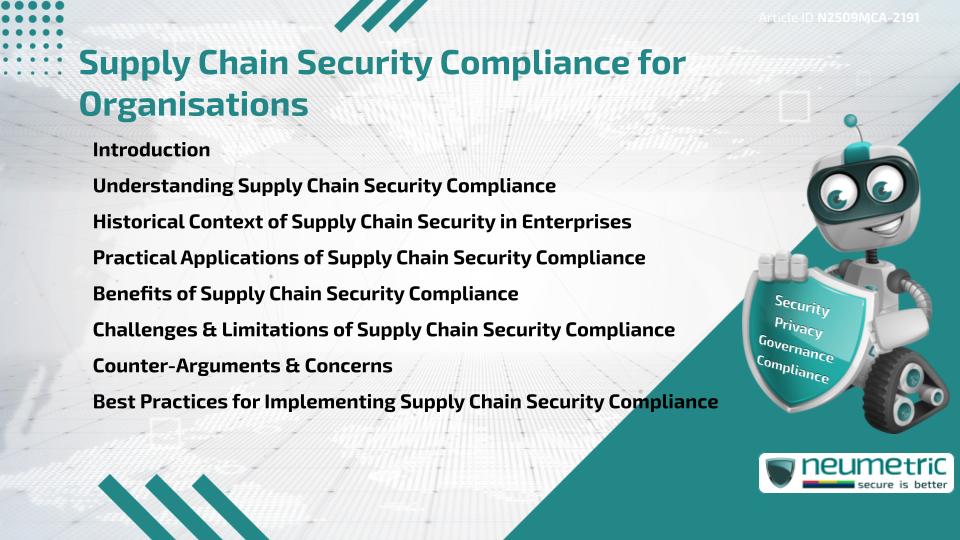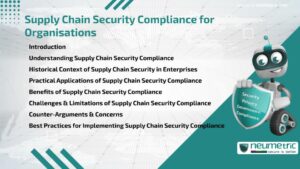Table of Contents
ToggleIntroduction
Supply Chains have become complex networks that involve multiple Vendors, Partners & Service Providers. This complexity increases the Risk of Cyber Threats, Data Breaches & Compliance Failures. Supply Chain Security Compliance ensures that Organisations can identify, assess & manage Risks across their Supply Chains while adhering to Regulatory Frameworks. By adopting Supply Chain Security Compliance, Organisations build stronger trust with Stakeholders & protect Sensitive Information. This article explores the historical context, benefits, challenges & Best Practices of Supply Chain Security Compliance.
Understanding Supply Chain Security Compliance
Supply Chain Security Compliance is the practice of ensuring that all entities in a Supply Chain follow established Security & Regulatory Standards. It requires Organisations to assess Vendor Risks, monitor Compliance & ensure contractual obligations align with Security requirements. For example, Compliance may include monitoring whether Third Party Vendors meet Standards such as ISO 27001, SOC 2 or GDPR.
Historical Context of Supply Chain Security in Enterprises
In earlier decades, Supply Chain Risk focused mainly on Logistics, Financial Risks & Operational delays. However, with the rise of Digital Transformation & Cloud Adoption, Cybersecurity Risks became critical. High-profile breaches linked to Third Party Vendors highlighted Vulnerabilities. Regulations such as the General Data Protection Regulation [GDPR], the Health Insurance Portability & Accountability Act [HIPAA] & Frameworks like the National Institute of Standards & Technology [NIST] have emphasised the need for Supply Chain Security Compliance.
Practical Applications of Supply Chain Security Compliance
Organisations apply Supply Chain Security Compliance through:
- Vendor Risk Assessments before onboarding.
- Continuous Monitoring of Third Party Security practices.
- Contractual obligations that include Compliance Requirements.
- regular Audits of Partners & Suppliers.
For instance, an Enterprise may require its Vendors to encrypt Sensitive Data or follow Incident Reporting procedures to meet Compliance Requirements.
Benefits of Supply Chain Security Compliance
The main benefits include:
- Reduced Risk of Data Breaches from Third Parties.
- Stronger alignment with International Regulations.
- Increased trust among Customers & Partners.
- Improved visibility across the Supply Chain.
- Better resilience against disruptions.
Supply Chain Security Compliance acts as a shield, protecting the entire chain by addressing weak links.
Challenges & Limitations of Supply Chain Security Compliance
Despite its advantages, Supply Chain Security Compliance poses challenges. Smaller Vendors may lack resources to meet strict Standards, creating inconsistencies. Continuous Monitoring across large, global Supply Chains can be costly & complex. There is also the Risk of over-reliance on Vendor self-reporting, which may not always be accurate.
Counter-Arguments & Concerns
Critics argue that Supply Chain Security Compliance can become overly bureaucratic, adding complexity without directly improving Security. Others suggest that Compliance Frameworks may not keep pace with evolving Cyber Threats. Balancing Compliance Requirements with Operational Efficiency is a common concern for Organisations.
Best Practices for Implementing Supply Chain Security Compliance
To succeed, Organisations should:
- Establish clear Compliance criteria for Vendors.
- Use automated tools for Continuous Monitoring.
- Include Compliance clauses in contracts.
- Perform regular Audits & Assessments.
- Provide training to Procurement & Security teams.
Conclusion
Supply Chain Security Compliance is essential for safeguarding modern Enterprises against Risks introduced by Third Party Vendors & Partners. By implementing structured practices, combining Automation with Oversight & aligning with International Regulations, Organisations can strengthen Trust, Resilience & Security.
Takeaways
- Supply Chain Security Compliance addresses Risks across complex Vendor networks.
- Historical events & Regulations have highlighted the importance of Third Party Security.
- Benefits include reduced Breaches, Trust & Resilience.
- Challenges involve costs, monitoring complexity & Vendor limitations.
- Best Practices involve Audits, Automation & strong Contractual obligations.
FAQ
What is Supply Chain Security Compliance?
It is the practice of ensuring all entities in a Supply Chain follow Regulatory & Security Standards to protect Data & Operations.
Why is Supply Chain Security Compliance important?
It is important because Third Party Vendors often introduce Vulnerabilities & Compliance helps Organisations mitigate these Risks.
What challenges arise in implementing Supply Chain Security Compliance?
Challenges include high costs, monitoring complexity, inconsistent Vendor capabilities & reliance on self-reporting.
How does Supply Chain Security Compliance benefit Organisations?
It benefits Organisations by reducing Risks, improving resilience & increasing trust among Stakeholders.
What Frameworks support Supply Chain Security Compliance?
Frameworks like ISO 27001, SOC 2, GDPR & NIST guidelines provide structured approaches.
Can small Vendors meet Supply Chain Compliance Requirements?
Yes, but they may need additional support or scaled requirements to align with Enterprise expectations.
How can Organisations monitor Vendor Compliance effectively?
They can use Continuous Monitoring Tools, conduct Audits & require regular Compliance Reports from Vendors.
Need help for Security, Privacy, Governance & VAPT?
Neumetric provides organisations the necessary help to achieve their Cybersecurity, Compliance, Governance, Privacy, Certifications & Pentesting needs.
Organisations & Businesses, specifically those which provide SaaS & AI Solutions in the Fintech, BFSI & other regulated sectors, usually need a Cybersecurity Partner for meeting & maintaining the ongoing Security & Privacy needs & requirements of their Enterprise Clients & Privacy conscious Customers.
SOC 2, ISO 27001, ISO 42001, NIST, HIPAA, HECVAT, EU GDPR are some of the Frameworks that are served by Fusion – a SaaS, multimodular, multitenant, centralised, automated, Cybersecurity & Compliance Management system.
Neumetric also provides Expert Services for technical security which covers VAPT for Web Applications, APIs, iOS & Android Mobile Apps, Security Testing for AWS & other Cloud Environments & Cloud Infrastructure & other similar scopes.
Reach out to us by Email or filling out the Contact Form…





